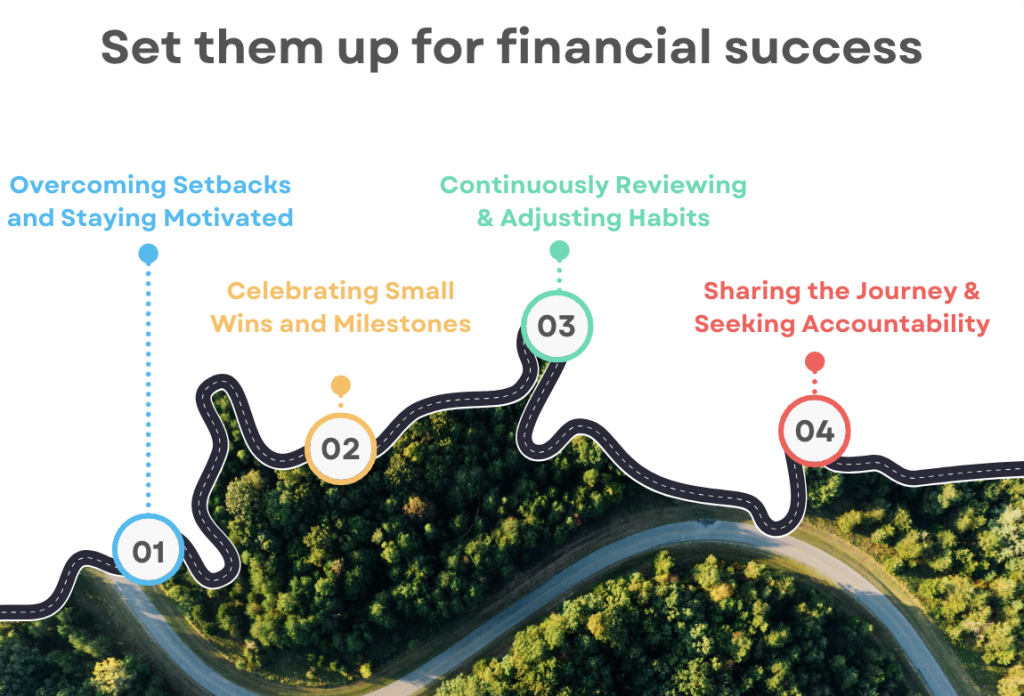Long-Term Financial Success
A parents’ guide to setting up their children for the desired financial success
Financial success is not rooted in money – rather, it is founded on the ability to maintain discipline and develop good money and lifestyle habits – Wangari Maina
As parents, one of the most valuable gifts you can give your children is the ability to maintain discipline and develop good habits. These skills are essential for achieving long-term success in all areas of life, from academics and finances to personal relationships and overall well-being.
This week, we will explore four pillars that your child should strengthen over time to enable them attain and sustain the financial success that you desire for them.

Overcoming Setbacks and Staying Motivated
Setbacks are an inevitable part of any journey. Whether it’s failing a test, missing a sports game, or struggling with a new skill, your child will face challenges. What sets them apart from the rest and gives them the ability to try again without giving up is how they respond to these setbacks.
Teach them resilience
- Encourage Self-Reflection to determine what went wrong and how they can improve next time because setbacks are opportunities for growth.
- Focus on Effort, Not Outcome because this helps them to understand that hard work and dedication are key to success.
- Celebrate Learning from Mistakes so that your child understands that mistakes are a natural part of the learning process. When celebrating, make it a component of two things:
- Celebrate the lessons learned from these mistakes and how they can be applied in the future.
- Praise your child for their effort and persistence rather than just their achievements.
Help them build the tools to stay motivated
- Setting Clear and SMART Goals, i.e. specific, measurable, achievable, realistic and time-bound goals. Smaller and manageable goals are great for keeping them motivated and focused.
- Foster a Positive and Supportive Environment that reinforces the idea that every small step forward is a success and mistakes are allowed in the process.
- Find Their Why (Purpose): Help your child understand the reasons behind their goals. When they connect with their purpose, they’ll be more motivated to stay on track.
Celebrating Small Wins and Milestones
- Acknowledge Progress: Regularly acknowledge and celebrate the small steps your child takes towards their goals. This could be as simple as completing a homework assignment on time or practicing a new skill for a set amount of time each day.
- Create a Reward System: Develop a reward system that acknowledges and celebrates milestones. This could be something as simple as stickers on a chart, special privileges, or small treats.
- Make It Fun: Make the celebration fun and engaging. For example, you could have a family dinner to celebrate a milestone or create a special tradition that marks each achievement.
Continuously Reviewing and Adjusting Habits
Habits are not set in stone; they need to be reviewed and adjusted regularly to ensure they remain effective.
- Schedule regular check-ins with your child to review their progress. This could be weekly or monthly, depending on their goals and needs.
- Reflect and Adjust to encourage your child to reflect on their habits, mind set, and identify areas that need adjustment. Help them make necessary changes to stay on track.
- Be Flexible. Life is unpredictable, and sometimes habits need to be adjusted due to changing circumstances. Teach your child to be flexible and adapt their habits and mindset as needed.
Sharing the Journey and Seeking Accountability
Having a support system can make a significant difference in maintaining discipline and good habits.
- Family Involvement allows the children to share their goals and progress with siblings and other family members to create a supportive environment.
- Encourage your child to find a buddy or mentor who can provide support and accountability. This could be you, the parent, a trusted family friend, teacher, or coach.
- Encourage open communication with your child so that they share their challenges and successes with you, and offer guidance and support when needed.
What about you as a parent?
Teaching your children the power of discipline and habits is a gift that will serve them well throughout their lives. By helping them overcome setbacks, celebrating small wins, continuously reviewing and adjusting their habits, and seeking accountability, you’re setting them up for long-term success.
For lasting financial success, discipline, patience and consistency will ensure your child is well-equipped to handle life’s challenges and achieve their goals.
Action Steps for Parents
- Reflect on Your Own Habits: Start by reflecting on your own habits and discipline. Children often learn by example, so make sure you’re modeling the behaviors you want them to adopt.
- Create a Family Plan: Develop a family plan that includes regular check-ins, celebrations of small wins, and opportunities for reflection and adjustment.
- Seek Support: If needed, take programs, seek support from teachers, coaches, or mentors who can help reinforce these habits in your child’s life.
By working together and using these strategies, you can help your child build the discipline and habits necessary for long-term financial success.








